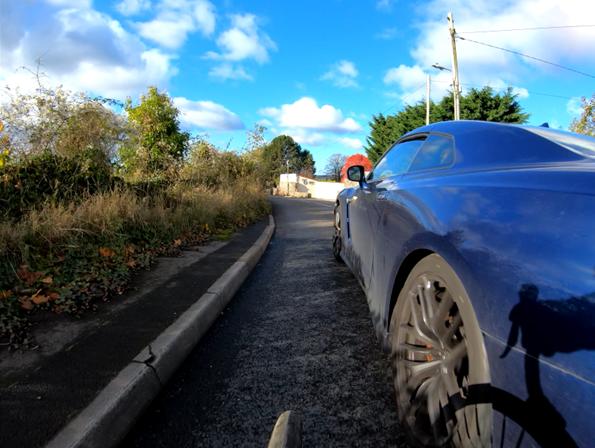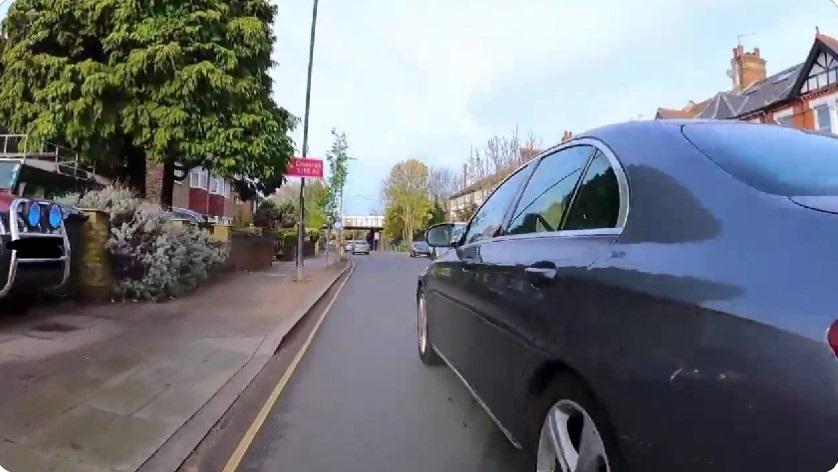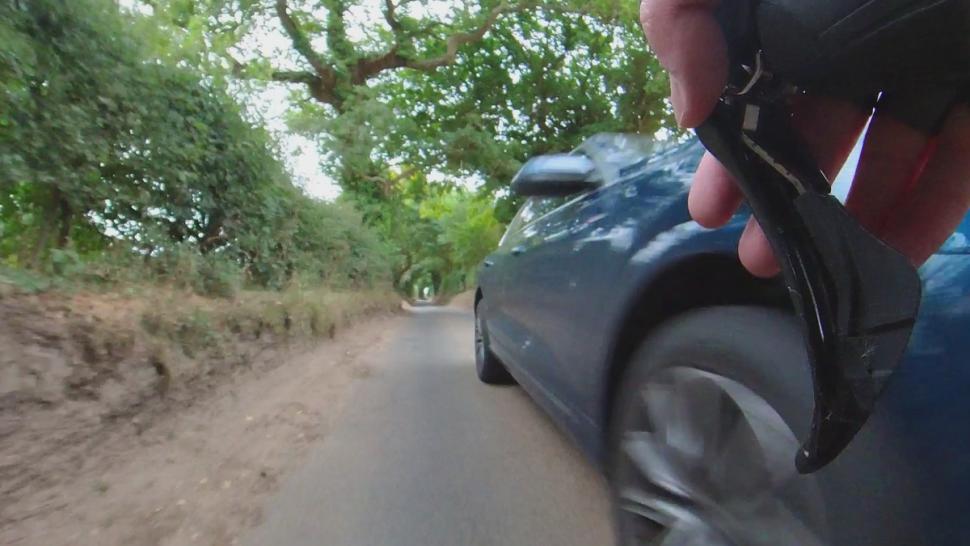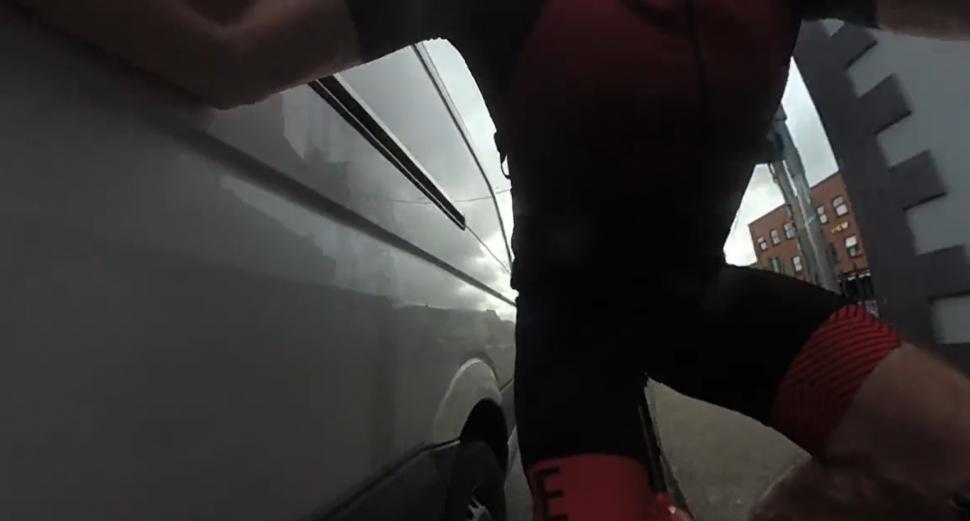- News
- Reviews
- Bikes
- Accessories
- Accessories - misc
- Computer mounts
- Bags
- Bar ends
- Bike bags & cases
- Bottle cages
- Bottles
- Cameras
- Car racks
- Child seats
- Computers
- Glasses
- GPS units
- Helmets
- Lights - front
- Lights - rear
- Lights - sets
- Locks
- Mirrors
- Mudguards
- Racks
- Pumps & CO2 inflators
- Puncture kits
- Reflectives
- Smart watches
- Stands and racks
- Trailers
- Clothing
- Components
- Bar tape & grips
- Bottom brackets
- Brake & gear cables
- Brake & STI levers
- Brake pads & spares
- Brakes
- Cassettes & freewheels
- Chains
- Chainsets & chainrings
- Derailleurs - front
- Derailleurs - rear
- Forks
- Gear levers & shifters
- Groupsets
- Handlebars & extensions
- Headsets
- Hubs
- Inner tubes
- Pedals
- Quick releases & skewers
- Saddles
- Seatposts
- Stems
- Wheels
- Tyres
- Health, fitness and nutrition
- Tools and workshop
- Miscellaneous
- Buyers Guides
- Features
- Forum
- Recommends
- Podcast
 Near Miss of the Day 821
Near Miss of the Day 821Here's what to do if you capture a near miss, close pass or collision on camera while cycling
With the number of cyclists running cameras on the rise and our Near Miss of the Day series now at well over 800 editions, it's probably time for a chat about all things camera footage and what you should do if you capture a close pass or worse...
In fact, the head of road safety at Nextbase — the dash cam manufacturer that runs the National Dash Cam Safety Portal used by many police forces — last May revealed that submissions had increased by 25 per cent since the Highway Code changes of January 2022.
Sadly, as was the case when we last published a guide to reporting footage back in 2018, there is still something of a postcode lottery in operation here, with some forces proactively taking action on videos posted on social media and regularly taking action on submissions, while others lag behind.
> Near Miss of the Day turns 100 — why do we do the feature and what have we learnt from it?
However, it does in many ways feel like things are getting better, and Detective Chief Superintendent Andy Cox of Lincolnshire Police who is the national lead on fatal collision investigation is keen for more of the public's support as 'Active Citizens'.
"We need the public's support as 'Active Citizens' using dash cam or headcam to report road crimes they witness," DCS Cox told road.cc.
"I believe this 24/7, 365 support in which the public can be anywhere and everywhere will act as a major deterrent to drivers who would otherwise be dangerous but now know their crimes can be captured by fellow citizens.
"As we start a new year, I want to put on record my sincere gratitude to every single person who took the time to submit footage. This life-saving work provides a real service to all road users. I know we (the police) are not always perfect in receiving this footage, acting upon it and updating people who take the time to submit.
"However, we are vastly improved from just a few years ago and we will continue to improve as this approach evolves."
So how can you submit video footage to your police force?
In short, it depends where the incident happened. There are 45 territorial police forces operating across the United Kingdom, and their approaches to video evidence gathered by members of the public vary.
Late in 2017, the four police forces operating in Wales launched Operation Snap, unveiling a website that allows people to submit photographic and video evidence and providing a national standard.
And while many English forces — including Gloucestershire as of December — accept Operation Snap submissions, there is no standard operating across the United Kingdom as a whole. Other English forces accept submissions directly via their website or through Nextbase who have a handy interactive map showing how to report to your force.
Police Scotland last year announced funding for a new National Dashcam Safety Portal, but the yet to be rolled-out scheme has since been under review and could be axed, prompting a campaign from Cycling UK to save it.
Submissions from Scotland presently should go through the Police Scotland Online Reporting Form, similarly in Northern Ireland you can go through the non-emergency online incident reporting.
So, wherever you live, if you are using a camera to film your ride, familiarise yourself with your local police force's policy regarding photographic and video evidence provided by the public. Also bear in mind, too, that the roads you ride on may be part of another force's territory.
While Operation Snap, for example, requires a video and supporting report to be submitted within ten days of the alleged offence, the earlier you submit it, the more time police have to investigate the incident; that is particularly important since any notice of intended prosecution must by law be issued to a registered keeper or owner of a motor vehicle within 14 days of the alleged offence.
The footage will also need to be unedited and may need to show one minute before and one minute after the incident occurs. We say 'may' because this used to be the case, but some of you have suggested it isn't nowadays, worth checking with your police force before you submit anything.
In some cases, they might ask you to remove it from any websites or social media channels you have submitted it to.
Wherever you are, the clearer the footage, the better it will be as evidence of what happened, so keep your camera clean and, of course, charged.
If you regularly watch videos captured by other cyclists on Britain's roads, you'll notice that often they will say the registration of the vehicle involved out loud – a good back-up in case it is difficult to read from the footage.
Obviously, recording your rides requires camera kit, something one of our readers advises: "Best camera for the job, tends to be a fixed camera to pick up close passes, and a helmet camera for everything else.
"I ride with a light helmet camera, a GoPro Session Hero 4. Battery lasts about an hour, and SD card can be easily removed and video moved to laptop, using QuickTime to clip clips. These are about £75 used from eBay. When saving a video, use reg number, time, date and location in the filename when you save it. Easier to go back to later."
If you want to film longer rides, you'll need to take battery life into consideration too.
Can you get a witness?
As with any road traffic incident, whether caught on film or not, having independent witnesses is very helpful, and is even required by some forces.
Also, while any cyclist knows that there is nothing like a near miss or collision to get the adrenaline pumping, try to keep calm – we've seen cases where riders have been assaulted by motorists after remonstrating with them, which can also in rare cases lead to police rejecting footage, or even referring the cyclist for prosecution for a public order offence.
Even where a force does accept video evidence, there's the question of whether they will act on it, and, we're aware that some cyclists don't send in footage of road traffic incidents now due to past experience.
That may be down to shortage of staff or other resources, or prioritising other types of crime over what may be seen as 'minor' motoring offences.
At the same time, we've seen police forces that do highlight cycle safety on social media – West Midlands Police and Surrey Police's road policing units, for example – take interest in footage posted there and ensure it is investigated properly.
A future without the postcode lottery?
There is always room for improvement, and Duncan Dollimore, head of campaigns at Cycling UK told us he hopes one day there will be a solution to the postcode lottery of present.
"Different police forces across the UK seem to apply very different approaches to video evidence submitted by cyclists," he explained to road.cc. "What one force would accept for investigation or prosecution is rejected by another as insufficient evidence or below the threshold for prosecution.
"To resolve this postcode lottery, it would help hugely if forces could collaborate to agree more consistent standards and processes for gathering, investigating, and taking action arising from the submission of video evidence.
"That would reinforce the messages given to irresponsible drivers, provide greater transparency on decisions made, and should reduce danger on our roads by improving enforcement action against careless driving."
Do you use a camera to record your ride and if so what is your experience, if any, of submitting footage to the police? Let us know in the comments below, and remember to state which police force it was.
Dan is the road.cc news editor and has spent the past four years writing stories and features, as well as (hopefully) keeping you entertained on the live blog. Having previously written about nearly every other sport under the sun for the Express, and the weird and wonderful world of non-league football for the Non-League Paper, Dan joined road.cc in 2020. Come the weekend you'll find him labouring up a hill, probably with a mouth full of jelly babies, or making a bonk-induced trip to a south of England petrol station... in search of more jelly babies.
Latest Comments
- ajuk.uk@gmail.com 3 sec ago
The problem with a blanket 20mph limit is that not all roads are of the same standard, yet this approach treats them as if they are, disregarding...
- mark1a 7 min 42 sec ago
True, especially on something aimed at mass-market consumers, a hub gear requires minimal and infrequent maintenance, particularly when paired with...
- Secret_squirrel 8 min 20 sec ago
ChapOnABike is a bit of an attention whore tbh. In the right on this one but regularly makes a twat of himself on Twitter as per last week....
- james-o 22 min 8 sec ago
It was Taichung Bike Week last week so much of the industry is out there at the mo. Though folks with bills to pay tend to avoid those shows.
- Steve K 31 min 21 sec ago
I'm with you, but I have a Ribble Endurance (Ti rather than AL) and it can take a rack - using the mudguard points and a seatpost clamp with...
- jiritichytr 32 min 27 sec ago
Some years ago pressure washer was accepted as most gentle way how to clean the bike. I use pressure washer more than 10 years for expesive road...
- Oldfatgit 35 min 36 sec ago
If its more than 50m, I can't get off and walk....
- chrisonabike 38 min 35 sec ago
...but in the popular imagination (and apparently sometimes in court) if you're crushed by a large motor vehicle and weren't wearing a helmet this...
- mattw 44 min 44 sec ago
AFAIK the Isle of Man is the only public place in the British Isles with no national speed limit, so he can drive it at 194mph if he wants to....



Add new comment
63 comments
I always ride with a camera, but am under no illusion that the police will do anything more than send out a warning letter.
Of the handful of incidents I've submitted, only one went to court. I was later informally told that this was the only prosecution for close passing a cyclist this force had done in the previous 3 years (and possibly longer).
The system/law needs changing to make it easier for the police to issue penalties for this sort of driving.
"The footage will also need to be unedited and show two minutes either side of the incident (one minute before and one minute after) that is being reported, and in some cases, they might ask you to remove it from any websites or social media channels you have submitted it to."
The 'two minutes either side' bit in the paragraph above does not apply for OpSnap in South Wales, so presumably doesn't apply in any of the other areas that use OpSnap. They do however insist that footage is unedited and not uploaded to any social media.
Sadly....it's pretty hit n miss..... expecially in Cambridgeshire , although it is BCH so 3 forces on the Traffic. If your footage is accepted all you get is they will get one of a number of listed options....... but no outcome sadly.. That has to change, it needs publicising more on Police social media including the punishment and what the close passing driver SHOULD have done rather than close passing.
Pages